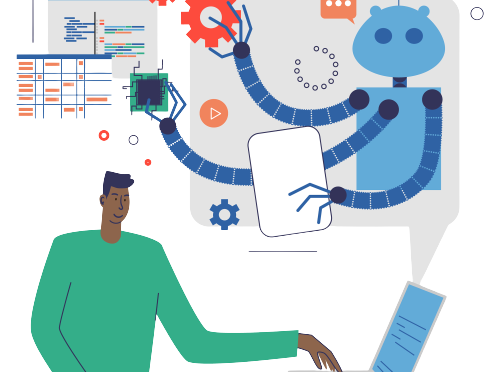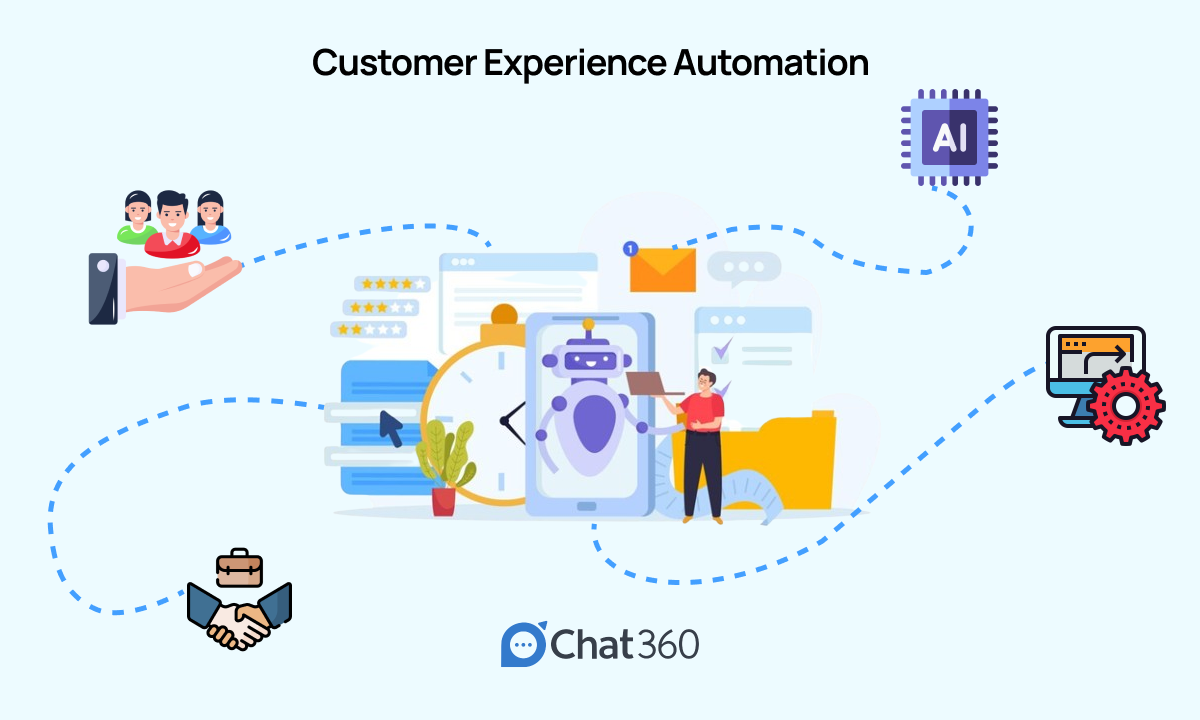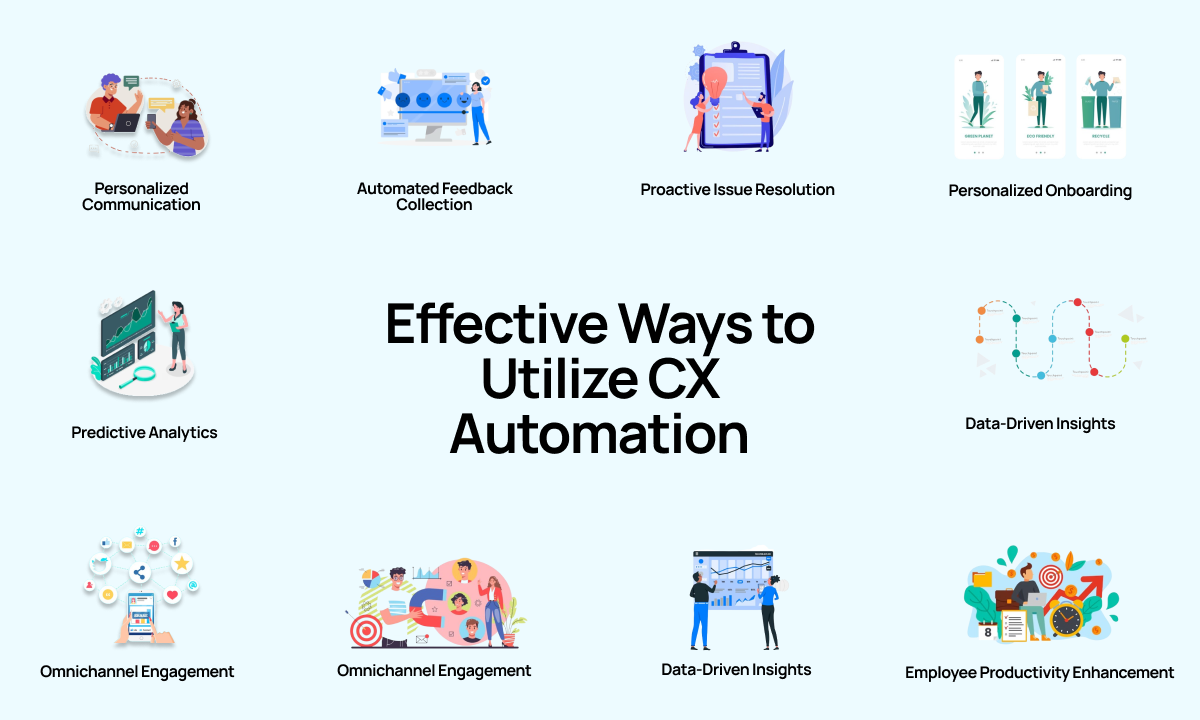All Blogs
Enhancing Customer Engagement with Customer Experience Automation
- Shivam Verma
- 30 September 2023

Customer experience automation is revolutionizing the way businesses interact with their clients. This innovative approach leverages technology to streamline and personalize customer interactions, resulting in heightened satisfaction and loyalty.

Through the integration of AI-powered chatbots, predictive analytics, and automated response systems, companies can deliver seamless and efficient customer service, round the clock. By automating routine tasks and providing instant solutions, customer experience automation not only reduces operational costs but also ensures consistent and high-quality interactions.
Ultimately, this technology empowers organizations to create memorable and tailored experiences, fostering lasting relationships and increasing brand value.
What is Customer Experience Automation?
Customer Experience Automation refers to the strategic use of technology, often powered by artificial intelligence (AI) and automation tools, to enhance and optimize every aspect of a customer’s journey with a brand or business.
It encompasses various processes, including data analysis, personalized communication, and the automation of routine tasks, to provide customers with seamless, consistent, and highly tailored interactions across multiple touchpoints.
The primary goal of Customer Experience Automation is to improve customer satisfaction, loyalty, and overall engagement by delivering efficient, convenient, and highly relevant experiences, ultimately driving business growth and success.
A Comparison: CX Automation vs Marketing Automation vs Customer Relationship Management
CX Automation, Marketing Automation, and Customer Relationship Management (CRM) are distinct but complementary approaches to managing and optimizing customer interactions.
While CX Automation focuses on enhancing the entire customer journey for improved experiences, Marketing Automation centers on automating marketing tasks and campaigns, and CRM provides a comprehensive solution for managing customer data and relationships across various departments within a company. Each has its unique features, goals, and impact on businesses.
The table below summarises the differences between CX Automation vs Marketing Automation vs Customer Relationship Management:
| Aspect | CX Automation | Marketing Automation | Customer Relationship Management (CRM) |
| Primary Focus | Enhancing the entire customer journey, optimizing all touchpoints for improved experiences. | Automating marketing processes, including lead generation, nurturing, and campaign management. | Managing and analyzing customer data, interactions, and relationships to drive sales and retention. |
| Scope | Broad and holistic, addressing various aspects of customer engagement, not limited to marketing. | Focused primarily on marketing tasks and activities, such as email marketing, lead scoring, and segmentation. | Comprehensive, encompassing marketing, sales, customer support, and post-purchase interactions. |
| Goal | Improving customer satisfaction, loyalty, and overall experience. | Increasing lead generation, conversion rates, and marketing efficiency. | Enhancing customer relationships, driving sales, and optimizing customer support. |
| Key Features | Personalization, predictive analytics, omnichannel engagement, and real-time feedback. | Email marketing automation, lead scoring, A/B testing, and campaign tracking. | Contact management, sales pipeline tracking, customer history, and reporting. |
| Automation Level | High level of automation across various customer touch points. | Primarily automates marketing-related tasks and campaigns. | Automates customer data management, sales processes, and support ticketing. |
| Data Utilization | Uses customer data to provide tailored experiences and predict customer needs. | Leverages customer data for segmentation, targeting, and campaign optimization. | Centralizes customer data for a 360-degree view, enabling informed decision-making. |
| Typical Users | Customer experience professionals, service teams, and business leaders. | Marketing teams and professionals responsible for lead generation and nurturing. | Sales, marketing, and customer support teams, as well as management. |
| Examples of Tools | AI-powered chatbots, customer feedback analysis tools, and customer journey mapping platforms. | Email marketing platforms (e.g., Mailchimp, HubSpot), lead scoring tools, and marketing automation software (e.g., Marketo, Pardot). | CRM software (e.g., Salesforce, HubSpot CRM), helpdesk solutions, and sales automation tools. |
| Impact on Business | Enhances customer satisfaction and loyalty, leading to increased retention and revenue. | Boosts marketing efficiency, lead conversion rates, and campaign performance. | Improves sales productivity, customer service, and overall business growth. |
Exploring Effective Ways to Utilize CX Automation
In today’s competitive business landscape, customer experience (CX) automation is a pivotal tool for enhancing customer satisfaction, building lasting relationships, and driving growth. Here are several impactful ways to leverage CX automation:

1. Personalized Communication:
- Utilize customer data and behavior analysis to send tailored messages, product recommendations, and special offers.
- Implement chatbots and virtual assistants to provide instant, personalized support and information 24/7.
2. Predictive Analytics:
- Employ predictive analytics to anticipate customer needs and preferences, allowing you to proactively address their requirements.
- Forecast demand and optimize inventory to ensure product availability and timely deliveries.
3. Omnichannel Engagement:
- Create a seamless experience by integrating CX automation across all customer touchpoints, including websites, mobile apps, social media, and email.
- Ensure consistent messaging and brand voice throughout the customer journey.
4. Automated Feedback Collection:
- Collect real-time feedback through surveys, chatbots, and feedback forms.
- Analyze customer sentiment and feedback data to identify areas for improvement and immediate issue resolution.
5. Customer Journey Mapping:
- Create a customer journey map, pinpointing essential touchpoints along the way.
- Automate processes to eliminate friction points and ensure a smooth transition between stages.
6. Proactive Issue Resolution:
- Implement automated alerts and workflows to detect and resolve issues before they impact the customer.
- Notify customers about potential problems and the actions being taken to address them.
7. Personalized Onboarding:
- Create personalized onboarding experiences for new customers using automation.
- Offer guided tours, tutorials, and resources to help customers get the most out of your products or services.
8. Customer Retention Strategies:
- Use automation to segment customers based on their engagement and purchase history.
- Develop targeted retention campaigns, such as loyalty programs, personalized discounts, and re-engagement emails.
9. Data-Driven Insights:
- Utilize data analytics to acquire a deeper understanding of customer behavior and preferences.
- Make informed decisions about product development, marketing strategies, and service improvements.
10. Employee Productivity Enhancement:
- Automate internal processes to free up employees’ time for more meaningful interactions with customers.
- Provide employees with the tools and information they need to deliver exceptional service.
Incorporating CX automation into your business strategy can lead to improved customer satisfaction, increased brand loyalty, and ultimately, sustainable growth.
Tailor your approach to match your specific industry and customer base, and regularly assess and adapt your automation strategies to stay ahead in the evolving CX landscape.
The Role of AI-Powered Chatbots in Customer Experience Automation
In the era of customer-centricity, businesses are constantly seeking innovative ways to enhance customer experiences.
AI-powered chatbots have emerged as a pivotal tool within the realm of Customer Experience Automation, revolutionizing the way companies engage with their audiences.
Here’s a closer look at the indispensable role these intelligent chatbots play:
1. Immediate and Round-the-Clock Support:
AI-driven chatbots offer round-the-clock, instant responses to customer inquiries.. This ensures that customers can get assistance whenever they need it, whether during regular business hours or in the middle of the night. The result is improved accessibility and customer satisfaction.
2. Efficient Query Resolution:
Chatbots excel at handling routine and repetitive queries, such as FAQs, order tracking, and basic troubleshooting. By automating these tasks, businesses can free up human agents to focus on more complex issues, leading to faster query resolution and higher productivity.
3. Personalization at Scale:
AI algorithms enable chatbots to analyze customer data and offer personalized recommendations or solutions. This personalization enhances the customer experience, making interactions feel tailored to individual preferences and needs.
4. Seamless Multichannel Engagement:
AI chatbots can operate across various communication channels, including websites, mobile apps, social media, and messaging platforms. This omnichannel capability ensures consistent and efficient support wherever customers choose to interact with the brand.
5. Handling High Volumes of Inquiries:
During peak periods, businesses may experience surges in customer inquiries. AI chatbots can effortlessly handle large volumes of requests simultaneously, ensuring that no customer is left waiting, thus preventing bottlenecks and frustration.
6. Data Collection and Insights:
Chatbots are effective tools for gathering valuable customer data. By analyzing interactions and feedback, businesses can gain insights into customer preferences, pain points, and trends, helping inform strategic decisions and product improvements.
7. Cost Savings:
Implementing chatbots for customer support leads to substantial operational cost reductions.Businesses can allocate resources more efficiently, as chatbots handle repetitive tasks, thereby lowering labor expenses.
8. Proactive Engagement:
AI chatbots can initiate conversations with customers based on triggers or user behavior, such as offering assistance when a customer spends an extended period on a particular webpage. This proactive engagement can lead to increased sales and improved customer satisfaction.
9. Scalability and Consistency:
Chatbots are highly scalable and can maintain consistent responses across a growing customer base. Whether a business has 100 or 100,000 customers, chatbots can deliver the same level of service quality.
10. Continuous Learning and Improvement:
AI-powered chatbots learn from each interaction, improving their responses over time. As they accumulate more data and feedback, their effectiveness and accuracy increase, ensuring ongoing enhancements in customer service.
In the age of Customer Experience Automation, AI-powered chatbots are indispensable tools for businesses seeking to deliver exceptional, efficient, and personalized customer experiences.
Their ability to provide instant support, handle high volumes of inquiries, and gather valuable data positions them as valuable assets in achieving the goals of enhanced customer satisfaction and loyalty.
Unlock the Full Potential of AI-Powered Chatbots with Chat360
In today’s digital age, customer engagement is paramount, and AI-powered chatbots have become essential tools for businesses seeking to excel in customer service and streamline operations.
Chat360, a leading provider of AI-powered chatbot solutions, offers a comprehensive platform that empowers businesses to harness the full potential of chatbots while seamlessly integrating with popular communication channels and CRM tools.
Integration with WhatsApp, Instagram, Facebook, Website, and CRM Tools:
1. Omnichannel Engagement:
Chat360 enables businesses to connect with customers on their preferred platforms. Whether it’s WhatsApp, Instagram, Facebook, or the company website, our chatbots provide consistent and personalized interactions across these channels.
This omnichannel approach ensures that customers can engage seamlessly, resulting in improved satisfaction and loyalty.
2. CRM Integration:
Our chatbots seamlessly integrate with CRM tools like Leadsquared, creating a unified and centralized hub for managing customer data and interactions.
By syncing customer information, chatbot interactions, and sales processes, businesses can gain a 360-degree view of their customers, allowing for more informed decision-making, targeted marketing, and personalized services.
3. Automated Customer Support:
Chat360’s AI chatbots excel at handling routine customer inquiries and support tasks. They can provide instant responses, troubleshoot common issues, and guide customers through processes such as account setup or order tracking.
This automation liberates human agents, enabling them to concentrate on intricate and value-driven responsibilities.
4. Proactive Engagement:
Our chatbots are equipped to initiate conversations with customers based on predefined triggers or user behavior.
For example, they can offer assistance when a customer spends time on a specific webpage or provide product recommendations based on browsing history. These proactive interactions can boost sales and enhance the overall customer experience.
5. Personalization at Scale:
Chat360’s chatbots utilize AI algorithms to analyze customer data and deliver highly personalized interactions. They can remember past interactions, recommend products or services based on individual preferences, and even address customers by name, creating a more engaging and tailored experience.
6. Continuous Learning and Improvement:
Our chatbots are designed to learn from each interaction, improving their responses and accuracy over time. As they accumulate data and customer feedback, they become more effective in understanding and addressing customer needs.
7. Scalability and Cost Efficiency:
Chat360’s chatbots are highly scalable, capable of handling large volumes of inquiries simultaneously without compromising quality. This scalability not only ensures consistent service but also helps businesses save on operational costs.
With Chat360’s AI-powered chatbots, businesses can achieve the maximum potential of AI automation while delivering exceptional customer experiences.
By integrating seamlessly with WhatsApp, Instagram, Facebook, Shopify, Google Sheets, Google Dialogflow, Setu, Gmail, CRM tools and more, Chat360 empowers companies to engage customers across various touchpoints, streamline processes, and drive growth through personalized, efficient, and intelligent interactions. Elevate your customer engagement game with Chat360 and stay ahead in the competitive landscape.
Sign up for a free trial today!